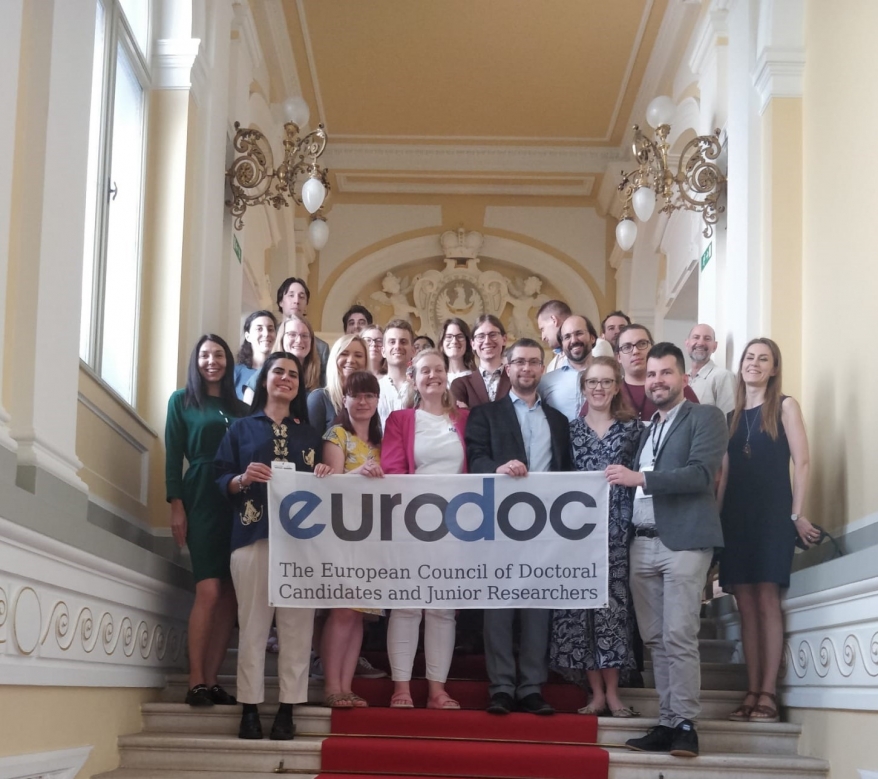From June 4th-7th, delegates from all over Europe gathered in Slovenia. First for the Eurodoc Conference 2024 – Towards a United European Research Area: The Ljubljana process and beyond. The conference focused on the developments in the European academic systems over the past 20 years. This includes an uneven brain circulation within the EU, but goes far beyond that in the existing disparities between member states. As the efforts of the past decade do not seem to significantly close this gap between the EU-12 and the EU-15, the topic is very timely and relevant. The conference was organised by Eurodoc and the Young Academy of Slovenia (Mlada akademija) - we thank them for the collaboration and for being excellent hosts. Hopefully, we will soon be able to share our recordings from the conference, but for now you can find the conference booklet here.
Next year, the conference will be held in Copenhagen, Denmark, and organised in collaboration with our Danish member organisation PhD Association of Networks Denmark (PAND).
In Eurodoc, our annual two-day conference is followed by the Annual General Meeting (AGM). This is where Eurodoc elects its administration and agrees on what will be the focus of the upcoming year.
From the elections until the end of the month, the incoming and outgoing administration work in collaboration to ensure a smooth handover. Thus, Monday is July 1st, and thus it marks the first day of the month after the AGM, meaning that the handover period will be over, the old administration has left its position and a new administration is in place.
The new Eurodoc administration consists, besides the 7 members of the administrative board, a secretariat coordinator, 7 working group coordinators and 3 members of the communication team. Besides this we have an advisory board of 4 people and countless volunteers in the Eurodoc working groups and our member National Association contributing to advocating for improved conditions of higher education, research, and researchers. It is teamwork at its finest and if you feel inspired to join, our working groups are open for all early career researchers (you can find the information here) and we also have vacancies for volunteer positions that you can check out here on the webpage.
We look forward to a year, where among other things we will continue to put focus on all the main areas of action that were targeted in the past few years of Eurodoc, but in the next months pay attention:
- Doctoral Supervision: The role of supervisors in the experience and success of doctoral candidates cannot be overstated. Effective supervision is crucial for career development post-doctorate and for safeguarding mental health and work-life balance. Therefore, Eurodoc aims to develop and promote a set of guidelines for good supervision, which we believe can set higher standards and substantially improve the quality of life for ECRs.
- Research Careers: While significant progress has been made within EU institutions, Early Career Researchers (ECRs) still suffer from precarious conditions, narrow career paths, and subpar working environments. A particular focus will be on postdoc careers, which are some of the most precarious positions researchers encounter during their careers.
- Research Assessment: This will involve a close dialogue with CoARA - the Coalition for Advancing Research Assessment - and a specific pilot project on habilitation as a case study. Habilitation is highly relevant to academic careers and poses challenges due to its fragmented and poorly documented procedures across Europe.
- Support to Ukraine: As the invasion of Ukraine continues, it is essential for EU institutions and the general population to remain vigilant and supportive of the Ukrainian people and researchers. Eurodoc will share stories of individuals who, like all of us, contribute to the global knowledge-building process while facing the hardships and tragedies of war.
- Widening Participation in the European Research Area: EU member countries are divided into two groups regarding their ability to benefit from EU research and development funding. The first group, consisting of the EU’s founders and early joiners, receives most of the funds, while the second group, made up of later joiners, struggles to compete. Eurodoc will continue to advocate for a redesign of funding strategies to promote more equitable growth in research and development capacity across the EU.
In the coming two months, things usually appear to be slowing down due to summer. However, we will still regularly be posting on Twitter, Instagram, Facebook, and LinkedIn pages - so stay tuned.
On behalf of the Eurodoc administration 2024/2025
Pil Maria Saugmann, Nicola Dengo, Hannah Schoch, Manca Lunder, Karl Edlund Kilbo, Magali Weissgerber and Norbert Bencze.

